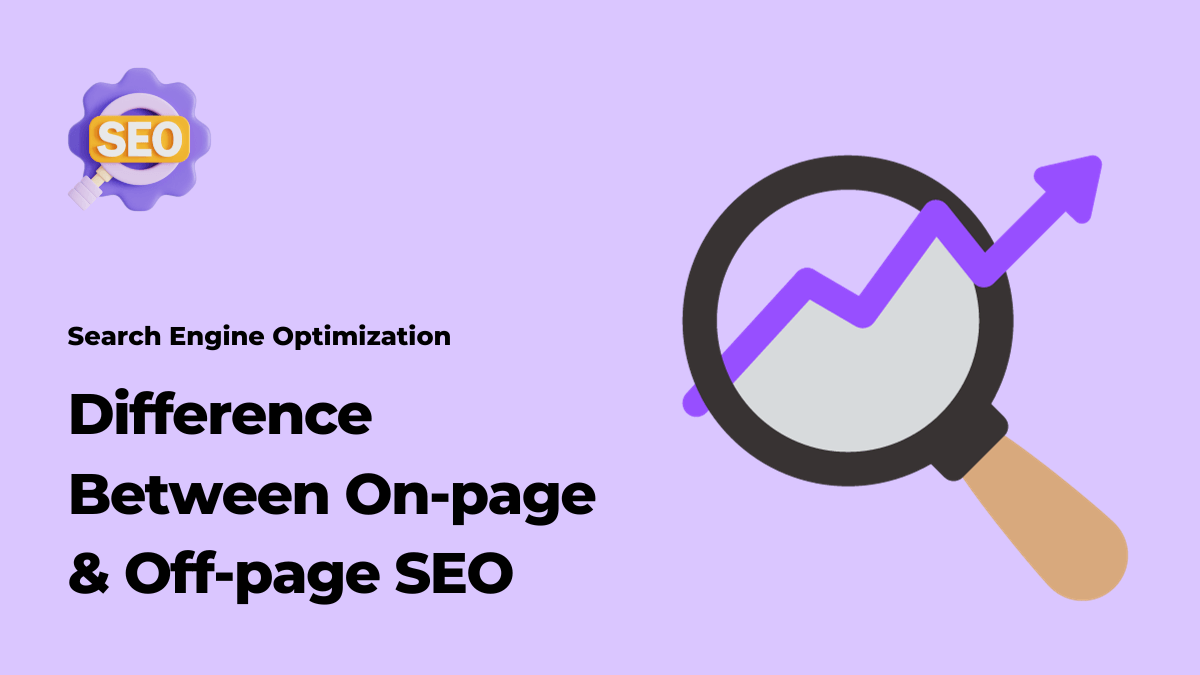Hey there, fellow digital explorers! If you’re diving into the world of SEO (Search Engine Optimization), you’ve probably come across the terms “on-page” and “off-page” SEO. If you’re scratching your head wondering what these terms mean and how they differ, you’re in the right place. In this article, I’ll break down the basics of on-page and off-page SEO in a way that’s easy to understand.
Table of Contents
On-Page SEO: The Foundation of Your Digital Home
Imagine your website as a house. On-page SEO is like the foundation and structure of that house. It involves optimizing the elements on your website to improve its visibility on search engines. Here are the key components of on-page SEO:
1. Quality Content: Content is king in the digital realm. On-page SEO starts with creating high-quality, relevant content that addresses the needs and questions of your audience. This content can be in the form of blog posts, product descriptions, or any text on your website.
2. Keywords: Keywords are the words and phrases people use when searching for information online. On-page SEO involves researching and strategically placing these keywords in your content. It’s important not to overdo it (a practice known as keyword stuffing), as this can harm your rankings.
3. Title Tags: Your website’s title tags are like the headlines of a book. They should accurately reflect the content on a particular page while incorporating relevant keywords. Clear and concise titles can improve click-through rates from search engine results.
4. Meta Descriptions: Meta descriptions are brief summaries of what a webpage is about. They appear in search results and can influence whether a user clicks on your link. A compelling meta description should encourage users to visit your site.
5. Headings and Subheadings: Organizing your content with headings (H1, H2, H3, etc.) not only makes it more readable but also helps search engines understand the structure and hierarchy of your information.
6. Image Optimization: Images can enhance your content, but they should be properly optimized with descriptive alt text and relevant filenames. This helps search engines index your images and improve the overall user experience.
7. Page Speed and Mobile-Friendliness: Slow-loading websites or those not optimized for mobile devices can lead to higher bounce rates. On-page SEO includes optimizing your site’s performance for both speed and mobile responsiveness.
8. Internal Links: Linking to other relevant pages within your website can improve user navigation and help search engines understand the relationships between different pieces of content.
In a nutshell, on-page SEO is all about making your website an attractive and user-friendly place for visitors while ensuring that search engines can easily crawl and understand your content.
Off-Page SEO: Building Relationships Beyond Your Digital Home
Now, let’s think of off-page SEO as the neighborhood where your digital house is located. Off-page SEO focuses on building your website’s reputation and authority in the online community. Here’s what’s involved:
1. Backlinks (Inbound Links): Backlinks are like referrals from other websites. When reputable websites link to your content, it’s seen as a vote of confidence in your site’s quality. Earning high-quality backlinks is a vital part of off-page SEO.
2. Social Media: Your presence on social media platforms is an essential part of off-page SEO. Sharing your content, engaging with your audience, and building a strong social media following can indirectly impact your website’s rankings.
3. Online Reviews and Reputation Management: Positive online reviews and a stellar online reputation can boost your website’s credibility. Managing your brand’s reputation is crucial for off-page SEO.
4. Guest Blogging: Contributing guest posts to other reputable websites in your niche can help you build backlinks and establish yourself as an authority in your field.
5. Influencer Marketing: Collaborating with influencers in your industry can introduce your website to a wider audience and generate valuable backlinks.
In essence, off-page SEO is about expanding your website’s presence beyond its virtual walls. It’s about creating a positive online footprint that search engines recognize and reward.
The Symbiotic Relationship
On-page and off-page SEO are not separate entities; they work in harmony to improve your website’s visibility in search results. Your on-page SEO provides a strong foundation for your content, making it worthy of recognition by search engines. Meanwhile, your off-page SEO efforts help spread the word about your content and validate its credibility through external signals.
In conclusion, on-page and off-page SEO are two sides of the same coin. To succeed in the ever-evolving world of SEO, it’s essential to focus on both aspects. By optimizing your website’s content and reputation, you can create a digital presence that not only ranks well on search engines but also resonates with your target audience.
So, whether you’re refining your existing website or starting from scratch, remember that the journey to SEO success involves both crafting your digital home and actively engaging with the online community.
